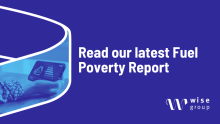In today’s increasingly digital world, having the skills and confidence to navigate technology is no longer optional – it’s essential. At the Wise Group, we’re committed to empowering individuals and breaking down barriers to opportunity, and our Digital Skills Service in partnership with CGI UK is a shining example of that.
The Wise Group – Community Justice Briefing
The Wise Group is one of the country’s leading social enterprises, empowering people across Scotland and North East England to unlock their potential and transform their futures.
We work in three key areas: community justice; employment services and skills; and energy advice and advocacy. We work across 11 Scottish prisons, supporting almost 800 people a year to reintegrate into their communities, and to address their attitudes and behaviours to offending.
Our New Routes service works with young men aged 25 and under, supporting them in the last six months of their prison sentence and on their release from prison. We meet them at the prison gates, and work with them after their release to put in place practical and emotional support. 50% of our mentors have direct experience of the justice system and imprisonment.
New Routes has had a significant impact on reducing re-offending and the number of people returning to custody. An independent evaluation of New Routes estimated that in its first two years of operation, the programme achieved potential savings and economic benefits of £13m. This figure is now estimated to be over £30m.
Other community justice programmes we deliver include:
- Wise Choices, for men over the age of 25 serving short-term prison sentences and who have mental health and/or addiction needs.
- A Through the Gate mentoring programme in the Durham and Tees Valley area, through the region’s Community Reintegration Company.
- A mentoring service which supports women in the community justice system, through the Shine PSP (a strategic partnership between public and third sector organisations).
We were pleased to welcome the Scottish Parliament Justice Committee on May 29, 2018, to take evidence from mentors working across New Routes and Wise Choices, and their clients. The Committee visited as part of their scrutiny of the Management of Offenders (Scotland) Bill. The Bill includes provision for electronic monitoring to play a greater role within the criminal justice system, as well as a reduction in the legal need for someone to disclose previous convictions.
Management of Offenders Bill – Our Views
Electronic Monitoring The Wise Group welcomes the policy shift towards a presumption against short term sentences in favour of community based solutions, such as electronic monitoring. Short term sentences do not work; 2 neither in terms of reducing reoffending/supporting rehabilitation, nor in value for money to the public purse.
Statistics have shown that it can cost up to £40k per year to imprison someone. We receive £1,600 to support someone in the New Routes programme in the community, achieving arguably more impact in terms of reducing reoffending.
Although the Committee does not expect to see a huge increase in the amount of electronic monitoring if the Bill is passed, we see it as a positive step towards increasing the use of rehabilitation and moving away from a focus on punishment.
However, from our own experience of delivering successful programmes to reduce reoffending, we are clear that the provision of an alternative to custody will not be successful without the inclusion of holistic support, in the form of mentoring. Without this, we risk electronic monitoring being viewed simply as another form of punishment by offenders, rather than a true opportunity to address the issues that led them to offend.
Offenders’ families will also need to be supported, so they can provide support themselves: mentors, like those the Wise Group provides across all of our community justice programmes, can help families to understand the electronic monitoring process, and the implications of the restrictions it places on the offender. Supporting ex-offenders to improve their personal relationships is a key part of the mentoring currently provided by the New Routes team.
We also welcome the proposal to introduce electronic devices which have GPS tracking systems. As well as evidencing someone’s guilt in being somewhere they are not supposed to be (breaching a restraining order etc), it could also evidence their innocence by showing that they were not in such a location as accused.
Disclosure
We greatly welcome the provision within Part 2 of the Bill to reduce the length of time before a conviction is spent. The current Disclosure rules can make it extremely difficult for someone with a conviction to move on. Our experience is that nothing reduces reoffending more effectively than a payslip.
Since 2013, the Wise Group and our partners in the New Routes PSP have supported almost 3,000 young men serving short-term sentences in Scotland. Around half of those we have engaged with have developed skills which improve their chances of getting a job, and over 400 have entered employment.
While we also welcome the proposal that sentences of up to 48 months may in time, become spent, we would like to see this go further. Presently, we have a situation where someone who may have served a sentence of 48+ months over 3 20 years ago is still denied access to employment and travel opportunities, as well as certain types of insurance and affordable credit.
Release Scotland is a body launched in May 2018, working to dispel the myths around employing someone with convictions, and one whose aims we support. While it is heartening to see large employers like Virgin and Greggs are backing this, we would welcome more action around promoting the benefits of exoffenders to the SME economy. SMEs make up over 99% of private sector businesses in Scotland, providing an estimated 1.2 million jobs. As the country’s economic growth continues to stagnate, precluding a large pool of talent – those with convictions to disclose – would seem like a missed opportunity. This will also be particularly important as the country prepares for Brexit, after which workforce gaps in key industries such as agriculture and hospitality are predicted. This has been recognised by the Ministry of Justice, who last week announced plans to offer financial incentives to businesses in England who hire ex-offenders under a new inmate education and employment strategy.
To promote employer education and awareness of the benefits and opportunities offered by employing ex-offenders, the Wise Group are working on ways to share our own experiences to offer guidance to other organisations on employing ex-offenders.
We believe it is important that a wide range of opportunities are made available to people. Entry level jobs will not suit the skills and capabilities of every ex-offender, and it important that we do not create an attitude that those with convictions should be grateful to have any job, as the system makes it difficult for them to find employment. This creates a ‘glass ceiling’ for ex-offenders, making it difficult to progress as anyone else would, and risking a situation where employment becomes a barrier to moving on from their past, rather than facilitating it.
Danny* – New Routes Mentor
Growing up in the care system, Danny lacked a parental figure to help him see that accumulating criminal convictions would have a long-term impact on his life. Spending time in Young Offender Institutions and later in adult prisons, and becoming addicted to drugs, meant that employment didn’t feature on his list of priorities as he grew up, either.
Following release from his last prison sentence, Danny’s personal relationship broke down and he found himself homeless and living in a hostel. There, he started attending a self-help group and started to seriously take action to change his life for the better; including becoming motivated to find employment.
Danny successfully applied to an Access course at college. He then went on to complete NC and HNC qualifications.
Danny completed a placement as part of his HNC, and after finishing his course he was offered a full-time job there. This required him to register with the sector regulator in order to be able to take up the job offer.
Upon receiving his application, the regulator informed Danny that he would need to attend a meeting for them to decide whether to grant him registration. The date for this was set for six months hence. This meant he was unable to begin work while he waited.
At the meeting, Danny’s manager gave testimony that he was a good worker who he could depend on to carry out his duties to a high standard. Danny described the circumstances around each of his convictions to the meeting panel, and outlined all the work he had put into his recovery, as well as the voluntary work he had carried out to support people who were still addicted. Despite this, he was refused registration due to the fact that he had too many previous convictions and not enough time had passed since his last conviction (eight years).
Even though he found himself unemployed and demotivated by being refused the opportunity to do a job that both he and his manager knew he was good at, returning to his previous life was never an option for Danny. While the majority of the large number of jobs he applied for never got back to him, Danny has now been a valued member of the Community Justice department at the Wise Group for over five years. This has allowed him to fulfil his passion of supporting people who have found themselves in a similar situation to where he was, a long time ago.














